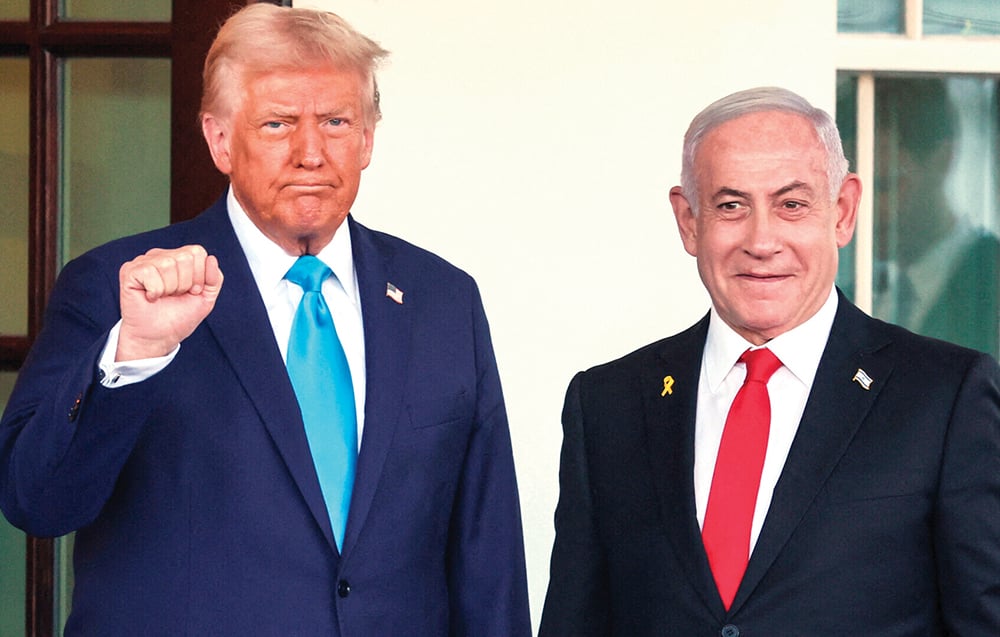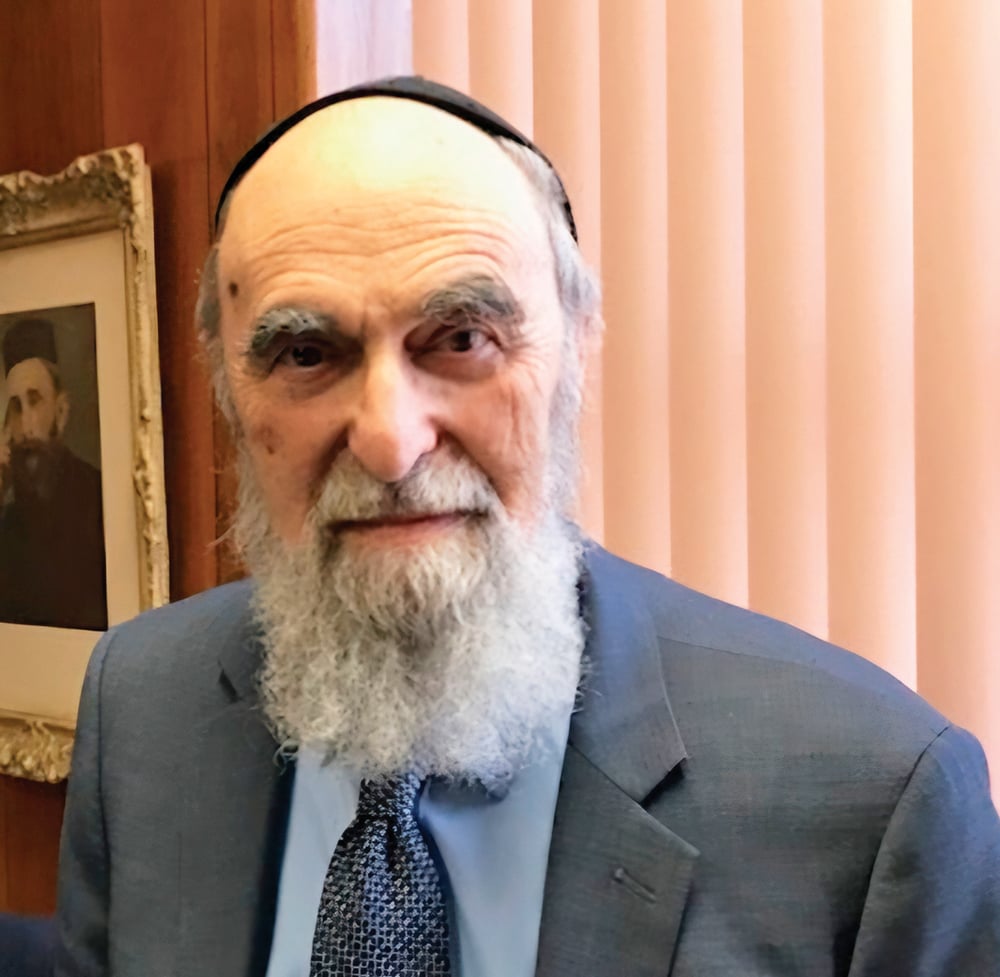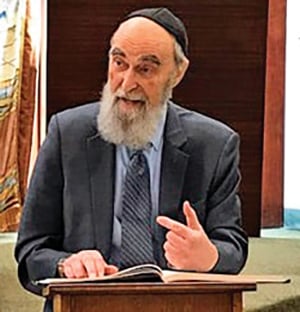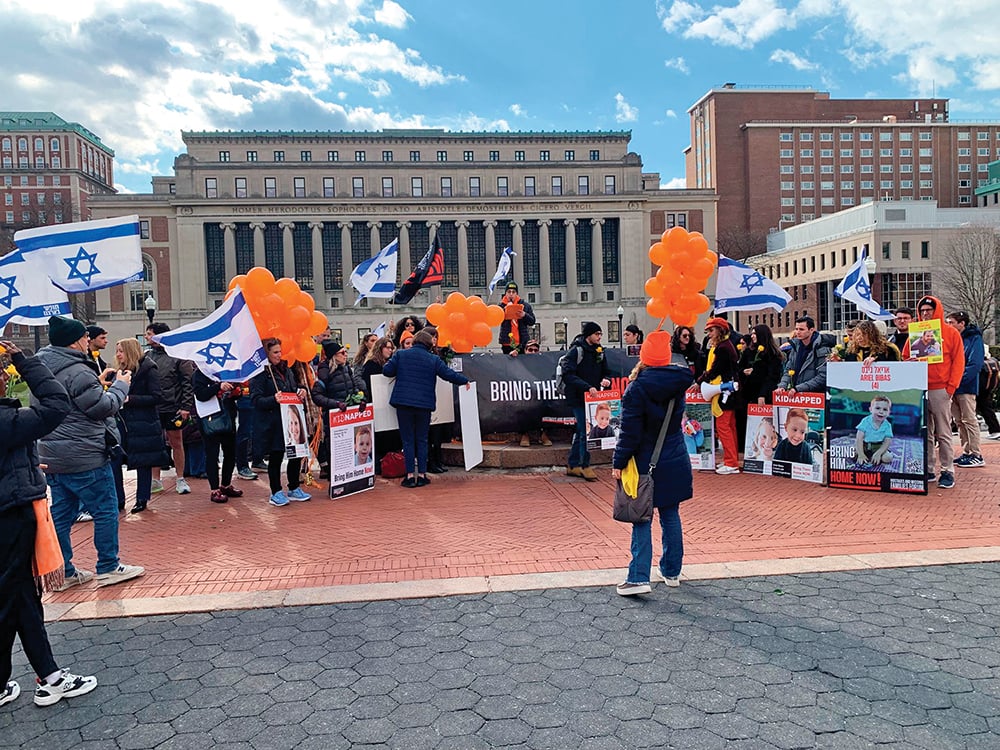“He’s exploring it with his people, with his staff. I think it’s something that could change history,” said Israeli Prime Minister Benjamin Netanyahu.

U.S. President Donald Trump said that the United States will “take over” and rebuild the Gaza Strip during a press conference with Israeli Prime Minister Benjamin Netanyahu on Tuesday, Feb. 4.
“The U.S. will take over the Gaza Strip, and we will do a job with it, too,” Trump said. “We’ll own it and be responsible for dismantling all of the dangerous, unexploded bombs and other weapons on the site, level the site and get rid of the destroyed buildings.”
Trump said in the explosive press conference, which ran about 40 minutes, that the reconstruction of Gaza would create economic development and supply “unlimited numbers of jobs and housing for the people of the area.”
The U.S. takeover of Gaza could involve the deployment of American troops, according to Trump. “We’ll do what is necessary,” he said. “If it’s necessary, we’ll do that.”
Trump said the United States would take a “long-term ownership position” of the land.
“This was not a decision made lightly,” he said. “Everybody I’ve spoken to loves the idea of the United States owning that piece of land, developing and creating thousands of jobs with something that will be magnificent in a really magnificent area that nobody would know.”
The president repeated his plan for Palestinians to be relocated outside of Gaza to regional countries during the rebuilding of Gaza.
“It could be numerous sites or it could be one large site, but the people will be able to live in comfort and peace,” Trump said. “We’ll make sure something really spectacular is done.”
‘This Is for Everybody’
Egypt, Jordan, Saudi Arabia, the United Arab Emirates, Qatar and the Palestinian Authority wrote to U.S. Secretary of State Marco Rubio on Monday to reject the idea of resettling Palestinians outside of Gaza. But Trump said on Tuesday that “neighboring countries of great wealth” could pay for the relocation of Gazans.
Trump suggested that under U.S. ownership and development, Palestinians could return to Gaza but that it would become an international zone.
“This is not for Israel,” Trump said. “This is for everybody in the Middle East—Arabs, Muslims; this is for everybody.”
“I think you’ll make that into an international, unbelievable place,” Trump said. “Palestinians will live there. Many people will live there.”
Elements of what Trump described were redolent of the so-called “Trump Mideast peace plan” that he unveiled in 2020, which included developing Gaza’s waterfront into a tourism destination.

“I don’t want to be cute. I don’t want to be a wise guy, but the Riviera of the Middle East,” the hotel magnate and president said Tuesday. “This could be so magnificent.”
Trump said that his Gaza development plan did not rule out a two-state solution to the Israeli-Palestinian conflict.
“It doesn’t mean anything about a two-state or one-state or any other state,” Trump said. “It means that we want to give people a chance at life. They have never had a chance at life because the Gaza Strip has been a hell hole.”
He added that he intends to visit the enclave, which Hamas has controlled, as part of a regional tour.
“I’ll visit Gaza,” he said. “I’ll visit Saudi Arabia, and I’ll visit other places all over the Middle East. The Middle East is an incredible place.”
Netanyahu said that he believes that Trump’s vision is in line with his war goal of ensuring that Gaza can never pose a threat to Israel again.
“President Trump is taking it to a much higher level,” Netanyahu said. “I think it’s worth paying attention to this. We’re talking about it. He’s exploring it with his people, with his staff. I think it’s something that could change history, and it’s worthwhile, really pursuing this avenue.”
Trump said that he had not yet made a decision about the United States recognizing Israeli sovereignty over Yehuda and Shomron, but that there will “probably” be a decision on the question “over the next four weeks.”
Netanyahu called Trump the “greatest friend Israel has ever had in the White House.”
“Ladies and gentlemen, all this in just two weeks,” Netanyahu said of Trump’s executive actions since the start of his second term. “Can we imagine where we’ll be in four years? I can.”
Danny Danon: ‘I Think It’s About Time to Think About New Ideas Out of the Box’
When U.S. President Donald Trump announced on Tuesday evening alongside Israeli Prime Minister Benjamin Netanyahu at a White House press conference that the United States intends to “take over” the Gaza Strip, the president caught the Israeli delegation somewhat off guard.
“We were all surprised to hear the president’s vision, and I think it’s about time to think about new ideas out of the box,” Danny Danon, the Israeli ambassador to the United Nations, told JNS in Washington on Wednesday morning.
“I’m at the United Nations. I hear so many leaders speak about the Palestinian issue and about Gaza, but no one is actually reaching out with ideas or with substance,” the Israeli envoy told JNS. “I think it was a really interesting approach of the president’s, and for us, it’s good news. We saw a president who stands with Israel, who understands the challenges and who is willing to take action.”
Asked if Netanyahu was surprised by Trump’s remarks, Danon told JNS that “we met Trump’s people. We have conversations. We know they were looking at the Gaza demolition zone, and that something major had to be done, but I think we were not aware about how much the United States will be involved.”
“I think we heard yesterday the leadership of the president—that he is putting the United States in front,” Danon said. “Unlike other countries who say, ‘Well, maybe we will do something,’ or ‘We will pay something,’ he said that we are willing to lead the efforts to build a future for Gaza.”
Danon told JNS that it’s time for other countries in the region to take action, and Israel has long said that Hamas cannot remain in Gaza. “For many countries, it’s more of the same to condemn Israel, to blame Israel, and not to think about an alternative,” he said.
JNS asked Danon if Netanyahu was disappointed that there wasn’t more of an emphasis on Iran, and in particular about the potential need for military action to curb Iran from obtaining nuclear weapons. (Trump has been somewhat more muted on the Islamic Republic than he was in his first term.)
“First of all, the economic pressure is important, and we welcome it,” Danon told JNS. “I think it’s the right thing to do.
“At the same time, we think we should keep the military option on the table. I’m sure the prime minister was able to reveal the information we have to the president,” the Israeli envoy added. “For the commitment to the security of Israel, we will continue the process of a dialogue with the United States, but we all agree that the time is moving fast. We have to be prepared for scenarios.”
Going on Offense
JNS also asked the Israeli ambassador about the hostage deal, and about whether he thinks it is fair to the Jewish state.
“The Hamas leadership should realize that they have no future in Gaza. Period. We are very determined about that, and I think the United States is also very determined about that,” Danon said.
The terror leaders could negotiate their way out of the Strip, as the Palestine Liberation Organization did in Lebanon in the early 1980s. “Options like that can be negotiated, but if they decide to stay in Gaza, we will have no choice but to resume the military activities,” Danon said.
Danon told JNS that the agreement “was a very hard decision for the prime minister and for the government.
“We know that it is a dangerous deal. We are aware of the risks,” he said. “We know that many of them will go back to terrorism. It’s a calculated risk. It’s a hard decision. I think it was all debated in the government.”
Asked what Trump welcoming Netanyahu in Washington meant for the Israeli prime minister’s domestic support in Israel, Danon, a longtime member of Netanyahu’s Likud party, spoke to JNS as an ambassador who represents the whole country.
“I was proud to see, as an Israeli, the prime minister being received the way he was received yesterday at the White House. The fact that he was the first prime minister speaks volumes, especially at the United Nations,” he said. “The fact that Israel was the first country to come is very important and I’m very happy about that because it shows that we are together.”
Working with Rep. Elise Stefanik (R-N.Y.), Trump’s nominee for U.S. envoy to the United Nations, is also important to Danon. “When you show that you are together, it gives you a lot of power,” he said.
JNS asked Danon about his plans at the global body in the coming weeks.
“We want to start to play offense. We’ve played defense for too long since Oct. 7 and all the resolutions and the bias. I think now it will be easier to play offense,” he said. “Still, it will be challenging, you have to admit. The United Nations will still be a hostile place. But with the moral clarity of Israel and the power of the United States, we can start to shift the narrative.”
Asked what “offense” means at the United Nations, Danon told JNS that “offense is to initiate the discussion, the resolutions. If today the discussion is completely against Israel, you’re still going to have hostile voices, but once you create other opportunities and platforms, you balance it.”










